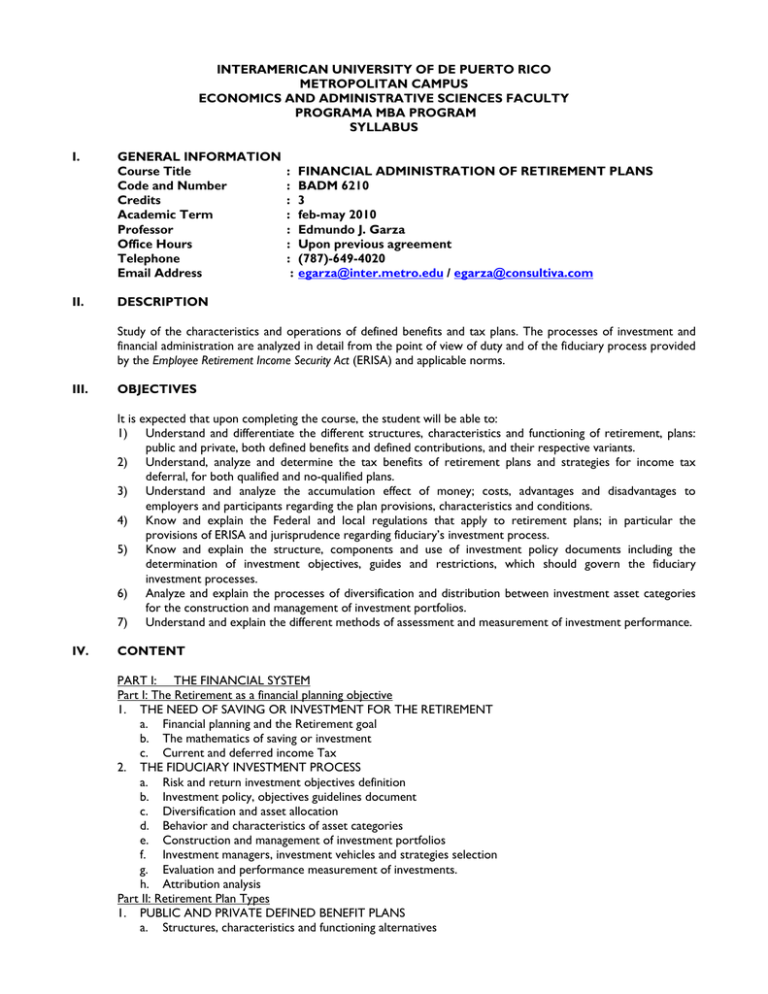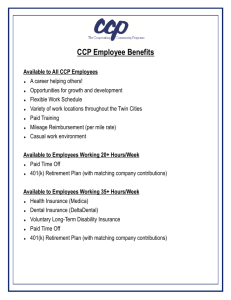INTERAMERICAN UNIVERSITY OF DE PUERTO RICO METROPOLITAN CAMPUS
advertisement

INTERAMERICAN UNIVERSITY OF DE PUERTO RICO METROPOLITAN CAMPUS ECONOMICS AND ADMINISTRATIVE SCIENCES FACULTY PROGRAMA MBA PROGRAM SYLLABUS I. GENERAL INFORMATION Course Title Code and Number Credits Academic Term Professor Office Hours Telephone Email Address II. DESCRIPTION : : : : : : : : FINANCIAL ADMINISTRATION OF RETIREMENT PLANS BADM 6210 3 feb-may 2010 Edmundo J. Garza Upon previous agreement (787)-649-4020 egarza@inter.metro.edu / egarza@consultiva.com Study of the characteristics and operations of defined benefits and tax plans. The processes of investment and financial administration are analyzed in detail from the point of view of duty and of the fiduciary process provided by the Employee Retirement Income Security Act (ERISA) and applicable norms. III. OBJECTIVES It is expected that upon completing the course, the student will be able to: 1) Understand and differentiate the different structures, characteristics and functioning of retirement, plans: public and private, both defined benefits and defined contributions, and their respective variants. 2) Understand, analyze and determine the tax benefits of retirement plans and strategies for income tax deferral, for both qualified and no-qualified plans. 3) Understand and analyze the accumulation effect of money; costs, advantages and disadvantages to employers and participants regarding the plan provisions, characteristics and conditions. 4) Know and explain the Federal and local regulations that apply to retirement plans; in particular the provisions of ERISA and jurisprudence regarding fiduciary’s investment process. 5) Know and explain the structure, components and use of investment policy documents including the determination of investment objectives, guides and restrictions, which should govern the fiduciary investment processes. 6) Analyze and explain the processes of diversification and distribution between investment asset categories for the construction and management of investment portfolios. 7) Understand and explain the different methods of assessment and measurement of investment performance. IV. CONTENT PART I: THE FINANCIAL SYSTEM Part I: The Retirement as a financial planning objective 1. THE NEED OF SAVING OR INVESTMENT FOR THE RETIREMENT a. Financial planning and the Retirement goal b. The mathematics of saving or investment c. Current and deferred income Tax 2. THE FIDUCIARY INVESTMENT PROCESS a. Risk and return investment objectives definition b. Investment policy, objectives guidelines document c. Diversification and asset allocation d. Behavior and characteristics of asset categories e. Construction and management of investment portfolios f. Investment managers, investment vehicles and strategies selection g. Evaluation and performance measurement of investments. h. Attribution analysis Part II: Retirement Plan Types 1. PUBLIC AND PRIVATE DEFINED BENEFIT PLANS a. Structures, characteristics and functioning alternatives FINANCIAL ADMINISTRATION OF RETIREMENT PLANS 2. 3. 2 b. Governmental regulatory provisions and fiduciary responsibilities c. Plan administration and investment processes d. Actuarial valuation process e. Accounting for defined benefit plans DEFINED CONTRIBUTION PLANS a. Structures, characteristics and functioning alternatives b. Governmental regulatory provisions and fiduciary responsibilities c. Plan administration and investment processes d. Record keeping NON-QUALIFIED PLANS a. Structures, characteristics and functioning alternatives b. Governmental regulatory provisions and fiduciary responsibilities c. Plan administration and investment processes d. Record keeping V. ACTIVITIES A. The course content is discussed through conferences. Active participation from the students is expected. B. There will be three partial exams C. There are assignments for each one of the exams. D. An optional monograph can be submitted at the end of the course. VI. EVALUATION VII. SPECIAL NOTES Points Final Grade % First partial exam 100 35 Second partial exam 100 35 Third partial exam 100 30 Assignments will help to improve the grade of each exam 300 100 Total Final Grade: The weighted average of partial exams and according to the Graduate Standard Curve. A. Special Accommodations Students who require special accommodations must request these services at the beginning of the course as soon as they notice that they need help. Students can access this service with Professor Jose Rodriguez, Coordinator of Students with Special Needs at the Guidance and Counseling Office on the first floor at Metro’s Student Center. B. Plagiarism Plagiarism, dishonesty, fraud and any other type of manipulation or inappropriate behavior related with academic performance are unacceptable in our institution. Disciplinary actions will be taken on students found guilty of such practice as established in Chapter V, Article 1, Section B.2 of the Student’s Rules and Regulations handbook. http://metro.inter.edu/servicios/documentos/reglamentosestudiantes2006.pdf Inter American University has very strict regulations regarding plagiarism (using the ideas or words of others without giving proper credit), so it is important that you specifically read FINANCIAL ADMINISTRATION OF RETIREMENT PLANS 2 Chapter 5, Article 1, Section B.2c of the Student’ Rules and Regulations Handbook. This section clearly explains what plagiarism is. In addition, it explains the types of sanctions students are exposed to when they commit it. C. Use of Electronic Devices Cellular (mobile) telephones and any other electronic device that could interrupt the teachinglearning process or disrupt a milieu favorable for academic excellence will be deactivated. Critical situations will be dealt with in an appropriate manner. The use of electronic devices that permit the accessing, storing or sending of data during tests or examinations is prohibited. VIII. TEACHING RESOURCES A. B. C. IX. Readings: the professor will provide a list of readings for the content discussion. References: the professor will provide specific references for the different topics and supplementary readings Internet references: http://www.dol.gov; http://www.freeerisa.com; http://www.hacienda.gobierno.pr http://www.nasdq.com; BIBLIOGRAPHY List of readings and references to be provided will include the correspondent bibliography. Rev. 2/2010



